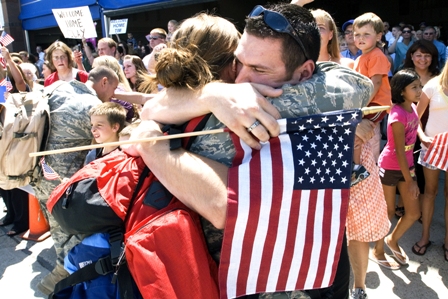David H. McNerney, a retired Army first sergeant who was awarded the
Medal of Honor for leading soldiers out of a Viet Cong ambush in 1967,
died of lung cancer on Oct. 10 at a veterans hospital in Houston. He was
79.
Sgt. McNerney was not supposed to be in Vietnam on March 22, 1967. At
35, he'd already served two tours in those jungles and had spent most of
the previous year training young troops to go to war.
"Let me tell you how things are in this company," Sgt. McNerney was said
to have told his men, who admitted they were afraid to look him in the
eye. "You do what I tell you to do and you do it when I tell you to do
it, because you will die in Vietnam if you don't."
He bonded with the soldiers during their training, and when the company
received orders to ship out, Sgt. McNerney negotiated with the unit's
commanding officers to be included on the outbound manifest, and he
started his third tour in Vietnam.
The company's mission that March day was to rendezvous with a
reconnaissance unit that had reportedly disappeared in a remote area
near Polei Doc in South Vietnam, close to the Cambodian border.
While trekking through thick vegetation, the company's front column was
hit with heavy fire and the rear platoon was surprised from behind.
Before the company's 108 soldiers could organize into defensive
positions, they were surrounded and outnumbered at least three to one.
In the first minutes of battle, 22 Americans were dead and about 40 were
wounded. The company's commanding officer and the forward artillery
observer were both killed in the ambush.
As the senior enlisted man, Sgt. McNerney took control of the remaining soldiers and coordinated their counterattack.
In order to get a better perspective of the battle, Sgt. McNerney began
to sprint toward the front lines as bullets kicked up dust around his
boots. He hit the ground and returned fire, killing a group of Viet Cong
soldiers in front of him.
Then Sgt. McNerney's attention became focused on a small orb about the
size of a pine cone that seemed to be floating toward him in slow
motion.
When the grenade exploded just a few feet away, Sgt. McNerney was blown in the air and suffered a laceration on his chest.
Ignoring his wounds and sensing the approaching enemy soldiers, Sgt.
McNerney recovered the artillery observer's radio and called in heavy
rounds to within 65 feet of his position - dangerously close to the
artillery's margin of error.
In order to mark the area that his troops occupied, Sgt. McNerney
searched for colored smoke canisters but realized they had all been
used.
Improvising, Sgt. McNerney grabbed his unit's brightly colored insignia
panel and headed through substantialenemy fire to a tall tree in a
clearing. He climbed up and tied the panel to the highest branch in the
canopy, so it could be seen by friendly aircraft.
He continually checked on the wounded soldiers and provided support to the men defending their positions.
The jungle was so dense that when Sgt. McNerney called for an evacuation
of the wounded, he was told helicopters could not land nearby.
Undeterred, he crawled to an exposed area beyond his unit's defensive
line to collect demolition materials from rucksacks that had been
dropped by soldiers. He wrapped the explosives around the trunks of
several trees and blew them up to create a landing zone.
When the helicopters finally arrived to pick up the wounded, Sgt.
McNerney refused to be evacuated, despite his severe injuries, and
stayed on the battlefield until he was relieved by a new commanding
officer a day later.
David Herbert McNerney was born June 2, 1931, in Lowell, Mass., and grew up in Houston.
He joined the Navy after graduating from high school in 1949 and served a
tour in Korea. After his enlistment ended in 1953, Sgt. McNerney
enrolled at the University of Houston but never attended a class.
While walking around campus, he spotted an Army paratrooper recruiting poster and signed up the next day.
After he received the Medal of Honor from President Lyndon B. Johnson in
1968, Sgt. McNerney volunteered for a fourth tour of combat in Vietnam.
When he retired from the Army in 1969, his decorations included five
awards of the Bronze Star Medal and two awards of the Purple Heart. A
documentary based on his Army career, "Honor in the Valley of Tears,"
was released in May.
Sgt. McNerney worked as a U.S. Customs inspector in Houston from 1970 until his retirement in 1995.
His wife, the former Parmelia "Charlotte" Moeckel, died in 2002. Survivors include a brother and a sister.
As a career soldier whose father had received the Distinguished Service
Cross in World War I, Sgt. McNerney was aware of the risks of his chosen
profession.
"I was a professional soldier. That was my job," he told Texas Monthly
in 1986. "That's why I did what I did. It wasn't a normal day. I was
fighting for my life.
 A welcoming home for our Troops.
A welcoming home for our Troops.

